

MAY • VOL. 4 • SERIES OF 2019
INSIGHTS is a monthly publication of BDB LAW to inform, update and provide perspectives to our clients and readers on significant tax-related court decisions and regulatory issuances (includes BIR, SEC, BSP and various government agencies).

DISCLAIMER: The contents of this Insights are summaries of selected issuances from various government agencies, Court decisions and articles written by our experts. They are intended for guidance only and as such should not be regarded as a substitute for professional advice.
Copyright © 2019 by Du-Baladad and Associates (BDB Law). All rights reserved. No part of this issue covered by this copyright may be produced and/or used in any form or by any means – graphic, electronic and mechanical without the written permission of the publisher.
What's Inside ...
- UPDATES
- Court Issuances
- CTA
- Regulatory Issuances
- BIR Issuances
- BSPIssuances
- SEC Issuances
- IC Issuances
- Court Issuances
- INSIGHTS
- Tax Incentives for Green Jobs
- OUR EXPERTS
- The Personalities

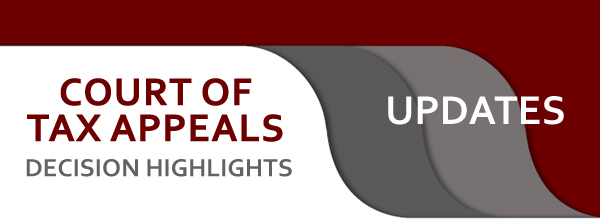
- Unavailability of the eFPS requires Taxpayers to manually file and pay on or before the tax due dates in order not to incur penalties and surcharges due to late filing. (BAP Credit Bureau, Inc. v. Commissioner of Internal Revenue CTA Case No. 9570, April 8, 2019)
- The reckoning point of the 120-day period within which the BIR should decide on the administrative claim for refund of the Taxpayer begins at the time the latter files such claim. (Kodec Precision, Inc. v. Commissioner of Internal Revenue, CTA EB No. 1762, April 8, 2019)
- Suppliers’ erroneous shifting of input VAT to Renewable Energy (RE) developers entitle the latter to reimbursement from the former, and not from the government. (Hedcor, Inc. v. Commissioner of Internal Revenue CTA EB No. 1761, April 8, 2019)
- Confirmation Letter from PEZA or SBMA is sufficient to prove customers coverage within the VAT Zero Rating under such respective laws. (Colt Commercial, Inc. v. Commissioner of Internal Revenue CTA Case No. 9340, April 10, 2019)
- The CTA has jurisdiction to determine the validity and/or constitutionality of rules and regulations, and other administrative issuances of the BIR. (San Miguel Brewery, v. Commissioner of Internal Revenue, CTA Case No. 9223, April 11, 2018)
-
A VAT invoice or receipts are valid proof of zero-rated sales, for the purpose of VAT refund, provided it indicated the invoice/receipt that it is a VAT registered entity with corresponding TIN shown. (Intergraph Process & Building Solutions Philippines, Inc., v. Commissioner of Internal Revenue, CTA Case No. 9454, April 15, 2018)
- When guilt is not proven with moral certainty, presumption of innocence must be favored, and exoneration must be granted as a matter of right. (People of the Philippines vs Arnel Cortez Manaloto, CTA Crim. Case Nos. O-454, O-455, O-456, and O-457, April 16, 2019)
- Section 40(C)(2)(a) in relation to 40(C)(6)(b) of the NIRC does not require prior BIR ruling validating an exchange transaction as tax-free. (Commissioner of Internal Revenue vs. Premium Tobacco Redrying & Fluecuring Corporation, CTA EB No. 1755, (CTA Case No. 8897), April 22, 2019)
- The term 'zero-rated sale' shall be written or printed prominently on the invoice or receipt, is a law on VAT invoicing requirements for purposes of refund. (Maersk Global Services Centres (Philippines), LTD., vs. Commissioner of Internal Revenue, CTA EB No. 1805 (CTA Case No. 9015), April 29, 2019)
- Subsequent submission of supporting documents made by a taxpayer will not move the commencement of the 120-day period. (Asurion Hong Kong Limited-ROHQ vs. Commissioner of Internal Revenue, CTA EB No. 1736 (CTA Case No. 9593), April 29, 2019)
- Absent the COC from the ERC, petitioner cannot qualify for VAT zero-rating under the EPIRA law. (Hedcor Sibulan, Inc., vs. Commissioner of Internal Revenue, CTA EB No. 1751 (CTA Case 8014), April 29, 2019)
- A holding company cannot be classified as a "bank or other financial institution" and be subject to Local Business Tax. (South China Resources Inc. (now known as “SOCResources, Inc.”) vs. Office of the City Treasurer and/or Makati City, CTA AC No.197, April 30, 2019)
Unavailability of the eFPS requires Taxpayers to manually file and pay on or before the tax due dates in order not to incur penalties and surcharges due to late filing.
Taxpayer was required to pay for penalties and surcharges by BIR because of its two-day late filing of its annual income tax return. The Taxpayer posits that the delay was beyond its control and due to the downtime, glitch and unavailability of eFPS. Moreover, it asserts that it followed the procedure laid down by RMC No. 20-2015 which provides for alternative steps to protect the taxpayer from the assessment of penalties. On the other hand, BIR posits that the claim has no factual and legal basis because the law sanctions the penalties for late payment of taxes.
CTA has held that RMC No. 20-2015 is not applicable to taxpayers filing BIR Form No. 1702RT; and the applicable issuance is RMC No. 14-2015. The latter RMC provides for the alternative procedure in case the ITR is not submitted via eFPS, which is to manually file the ITR and pay to Authorized Agent Banks (AAB)/Collection Agents (CA), in the RDO where it is registered. Then it should also file on or before the due dates of the respective returns and attach the proof of unsuccessful eFPS attempts, then RE-FILE ELECTRONICALLY within fifteen (15) days after the statutory deadline.
Hence, the imposition of penalties and surcharges was properly made by BIR, and the Taxpayer is not entitled to the claim of refund. (BAP Credit Bureau, Inc. v. Commissioner of Internal Revenue CTA Case No. 9570, April 8, 2019)
The reckoning point of the 120-day period within which the BIR should decide on the administrative claim for refund of the Taxpayer begins at the time the latter files such claim.
Taxpayer posits that the reckoning period of the 120-day period starts upon the completion of the submission of supporting documents, or May 9, 2017, giving BIR until September 6, 2017 to decide on the Petition, and until August 2, 2017 to elevate the claim to CTA Division. On the other hand, BIR posits that the reckoning period starts at the time of filing the claim, or November 29, 2016, or until March 29, 2017 to decide or act on the claim, and until April 28, 2017 to file its appeal before the CTA Division. Ultimately, Taxpayer appealed the decision to CTA En Banc.
CTA En Banc has held that CTA Division correctly dismissed the Petition because the Taxpayer failed to observe the 120-day period within which to file the judicial claim. Pursuant to RMC No. 54-2014 and jurisprudence, the Taxpayer is required, at the time it files its claim, to complete its supporting documents and attest that it will no longer submit any other document to prove its claim.
A taxpayer must prove not only his entitlement to a refund but also his compliance with the procedural due process as non-observance of the prescriptive periods within to file the administrative and judicial claims would result in the denial of the claim. (Kodec Precision, Inc. v. Commissioner of Internal Revenue, CTA EB No. 1762, April 8, 2019)
Suppliers’ erroneous shifting of input VAT to Renewable Energy (RE) developers entitle the latter to reimbursement from the former, and not from the government.
Taxpayer filed an administrative claim from BIR for its alleged unutilized input VAT for the third quarter of 2012. Taxpayer based its claim on R.A. No. 9513, which provides tax incentives to encourage private investments in renewable energy (RE) projects by granting VAT zero-rating to their purchases of domestic goods, property of goods necessary for the development, construction or installation of its plant facilities. BIR did not respond to the administrative claim, which led its elevation to CTA Division. Nevertheless, CTA Division denied the claim for lack of merit.
CTA En Banc has held that the above-mentioned law not only entitle RE developers to VAT zero-rating of its output VAT, but also on its input VAT on purchases. In the case of Coral Bay Nickel Corporation v. CIR, RE developers should not pay any input VAT on its purchases from its suppliers; any amount of input VAT paid by RE developers can be reimbursed from the supplier due to mistake, and not from the government.
Here, the transactions paid by Taxpayer from the suppliers include the shifting of input VAT. Therefore, the Taxpayer must ask for reimbursement from its suppliers in proportion to its erroneous payment of input VAT, and not from BIR. (Hedcor, Inc. v. Commissioner of Internal Revenue CTA EB No. 1761, April 8, 2019)
Note: Justice Manahan in her Dissenting Opinion stated that the claim for refund of excess and unutilized input VAT is governed by Section 112 of the 1997 NIRC, as amended, and to require the Taxpayer to seek refund from its suppliers instead from the government which possibly received such payments is tantamount to imposing new conditions or norms for claims for refund as provided in the above-mentioned Section, instead of merely interpreting its provisions. (Hedcor, Inc. v. Commissioner of Internal Revenue CTA EB No. 1761, April 8, 2019)
The Court of Tax Appeals is not bound by the issues specifically raised by the parties but may also rule upon related issues necessary to achieve an orderly disposition of the case.
BIR assessed the Taxpayer for deficiency taxes. Subsequently, Taxpayer filed its Petition for Review with CTA Division, and the court partially granted the petition. Subsequently, BIR filed a Petition for Review before CTA En Banc.
CTA En Banc, in exercising its exclusive appellate jurisdiction, noticed that BIR did not have a valid Letter of Authority (LOA) to assess the Taxpayer. And although such issue was not raised by the Taxpayer, Section 1, Rule 4 of the Revised Rules of Court of Tax Appeals (RRCTA) states that the Court is not bound by the issues specifically raised by the parties but may also rule upon related issues necessary to achieve an orderly disposition of the case. Therefore, CTA En Banc has the authority to consider in its decision the question on scope of authority of revenue officers who were named in the LOA even though the parties had not raised the same in their pleading or memoranda. (Commissioner of Internal Revenue v. Wellington Investment & Manufacturing Corporation CTA EB No. 1773, April 11, 2019)
Confirmation Letter from PEZA or SBMA is sufficient to prove customers’ coverage within the VAT Zero Rating under such respective laws.
The Court of Tax Appeals, in relation to Section 112 of NIRC, laid down the requisites that must be satisfied, to wit:
1. that the taxpayer is VAT-registered;
2. that the claim for refund was filed within the prescriptive period;
3. that there must be zero-rated or effectively zero-rated sales;
4. that input taxes were incurred or paid;
5. that such input taxes are attributable to zero-rated or effectively zero-rated sales; and
6. that the input taxes were not applied against any output VAT liability.
First, Taxpayer is a VAT-registered entity as evidenced by its TIN and COR. Second, CTA held that the Petition was filed on time. Third, the existence of sales to PEZA and SBMA registered corporation through a Confirmation Letter from PEZA or SBMA proves the existence of VAT Zero-rated sales. And fourth, fifth and sixth, input taxes were incurred and paid as evidenced by certified true copies of sales invoices for purchases of goods, and BOC Import Entry and Internal Revenue Declarations with confirmation receipts evidencing payment of VAT for imported goods. Moreover, the input taxes claimed were attributable to zero-rated sales of Taxpayer and not applied to its output taxes.
Therefore, Taxpayer is entitled to its claim for VAT refund for its zero-rated transactions that complied with the above-discussed requisites. (Colt Commercial, Inc. v. Commissioner of Internal Revenue CTA Case No. 9340, April 10, 2019)
The CTA has jurisdiction to determine the validity and/or constitutionality of rules and regulations, and other administrative issuances of the BIR.
The taxpayer argues that the CTA has the power to rule on the validity of RMC No. 90-2012, which imposed the excise tax rate of P20.57 for alcoholic products in bottle and in can. On the other hand, the BIR contends that the authority to declare an administrative issuance as void is conferred by the Constitution upon courts of general jurisdiction, and not on courts of special jurisdiction such as the CTA. Hence, the CTA lacks jurisdiction to declare null and void the provision of RMC No. 90-2012 imposing excise tax rate of P20.57 on alcoholic products.
The CTA held that it has jurisdiction to determine the validity and/or constitutionality of rules and regulations, and other administrative issuances of the BIR. The CTA has undoubted jurisdiction to pass upon the constitutionality or validity of a tax law or regulation when raised by the taxpayer as a defense in disputing or contesting an assessment or claiming a refund. It may likewise take cognizance of cases directly challenging the constitutionality or validity of a tax law or regulation or administrative issuance such as revenue orders, revenue memorandum circulars and rulings.
Nonetheless, the CTA held that RMC No. 90-2012, upon which the BIR anchored its imposition of a higher rate of excise tax on the taxpayer’s alcoholic products, was issued in valid exercise of the CIR’s right to interpret tax laws, a power explicitly vested in him under Section 4 of the NIRC, as amended. (San Miguel Brewery, v. Commissioner of Internal Revenue, CTA Case No. 9223, April 11, 2019)
Tax refunds are in the nature of tax exemptions and must be construed strictissimi juris against the person or entity claiming the refund.
The taxpayer filed with the BIR an administrative claim for refund of or issuance of a tax credit certificate for its alleged excess and unutilized Creditable Withholding Tax (CWT) for the year 2013. The BIR argued that the burden of proof is on the taxpayer who is charged with the heavy burden of proving that he has complied with and satisfied all the statutory and administrative requirements to be entitled to the tax refund.
The Court held that the taxpayer must comply with the three basic requisites for refund of excess CWT, to wit:
1. The claim for refund must be filed within the two-year prescriptive period as provided under Sections 204(C) and 229 of the Tax Code, as amended;
2. The fact of withholding must be established by a copy of a statement duly issued by the payor (withholding agent) to the payee, showing the amount paid and the amount of tax withheld therefrom; and
3. The income upon which the taxes were withheld must be included in the return of the recipient.
The Court held that the taxpayer’s properly substantiated CWT for CY 2013 is a lot higher than the tax credits, thus, there is no excess CWT available for refund. The court stressed that the taxpayer has the burden of proof to establish the factual basis of his or her claim for tax credit or refund. Tax refunds are in the nature of tax exemptions. As such, they are regarded as in derogation of sovereign authority and to be construed strictissimi juris against the person or entity claiming the refund. (Tullett Prebon (Philippines), Inc. v. Commissioner of Internal Revenue, CTA Case No. 9320, April 12, 2019
A VAT invoice or receipts are valid proof of zero-rated sales, for the purpose of VAT refund, provided it indicated the invoice/receipt that it is a VAT registered entity with corresponding TIN shown.
The taxpayer sold services to various entities registered with the PEZA. It filed with the BIR an administrative claim for tax refund representing the excess input taxes that are attributable to its VAT zero-rated sales for the year 2014. The BIR argued that the taxpayer was not able to fully substantiate its claim by proper documents, such as sales invoices, official receipts and others.
The court partially granted the taxpayer’s claim. The taxpayer failed to prove that one of its clients is duly registered with the PEZA, thus the corresponding sales were denied VAT zero-rating. The CTA also emphasized that RR No. 16-05 requires that a statement that the seller is a VAT-registered person, followed by his TIN, shall be indicated in VAT invoice or VAT official receipt. Hence, it also disallowed the input taxes being claimed due to the taxpayer’s failure to meet the substantiation requirements. (Intergraph Process & Building Solutions Philippines, Inc., v. Commissioner of Internal Revenue, CTA Case No. 9454, April 15, 2019)
The fifteen-day period granted to the taxpayer to reply to the PAN before a FAN can be issued is mandatory.
The taxpayer states that the FAN was issued prior to the lapse of the fifteen (15) day period granted by law to respond to the PAN. Thus, the taxpayer argues that the FAN was issued in violation of the due process requirement, thereby rendering the FAN void. Petitioner further argues the fact that the BIR already prepared, finalized and issued the FAN prior to the lapse of the reglementary period proves that the BIR could not have considered the taxpayer’s reply to the PAN when it issued the FAN.
The BIR, on the other hand, contends that it has substantially complied with the requirements under RR 12-99 when it issued the FAN sixteen (16) days after issuance of the PAN to the petitioner. The BIR also argues that a protest against the PAN is not indispensable, and the fact of non-protest of the PAN will not render the PAN final and executory.
The CTA noted that the fifteen-day period granted to the taxpayer to reply to the PAN before a FAN can be issued is mandatory. Time is essential in this entire procedure of administrative protest because any escalation in the levels of the protest, i.e., FLD/FAN, leaves the taxpayer with fewer options, such as going to the Court of Tax Appeals on appeal or entering into a compromise settlement, among others, which all entail financial costs to the taxpayer. Hence, the period granted to assail the PAN is integral to the right of due process granted by law to the taxpayer. (Monza SPV-AMC ("Asset Management Co.), Inc. v. Commissioner of Internal Revenue, CTA Case No. 9153, April 15, 2019)
When guilt is not proven with moral certainty, presumption of innocence must be favored, and exoneration must be granted as a matter of right.
Taxpayer is charged of the crimes of (1) attempt to evade or defeat the payment of Value-Added Taxes (VAT); (2) attempt to evade or defeat tax by substantial under-declaration of income tax; (3) failure to file VAT Return; and (4) failure to supply correct and accurate information in his Income Tax Return. During the trial, it was admitted that the BIR merely relied on the deferred revenue account stated in the accused's financial statement then conclude that there is an undeclared income.
The Court ruled that for lack of supporting documents, the prosecution has failed to convince this Court that there is undeclared income. The BIR failed to prove the elements of the crimes charged. Under Sections 254 and 255 of the National Internal Revenue Code of 1997, as amended. "When guilt is not proven with moral certainty, it has been our policy of long standing that the presumption of innocence must be favored, and exoneration granted as a matter of right”. (People of the Philippines vs Arnel Cortez Manaloto, CTA Crim. Case Nos. O-454, O-455, O-456, and O-457, April 16, 2019)
Section 40(C)(2)(a) in relation to 40(C)(6)(b) of the NIRC does not require prior BIR ruling validating an exchange transaction as tax-free.
The BIR assessed the taxpayer for deficiency income tax, VAT and DST for the transfer of assets of taxpayer to Fortune Tobacco Corporation (FTC) in exchange for the latter’s shares. The BIR contends that the provisions of RR No. 18-2001 are mandatory preconditions for a taxpayer to avail of the benefits of Section 40(C)(2) of the NIRC, as amended. Specifically, a request for ruling on such matter, plus a BIR Certification/Ruling affirming the transaction as a tax-free exchange must be appended to requesting party's audited financial statement and income tax returns during the year of exchange must first be complied with.
The court ruled that nowhere in Section 40(C)(2)(a) in relation to 40(C)(6)(b) of the NIRC, as amended, that requires a prior BIR ruling validating an exchange transaction as tax-free before respondent may reap the benefits of the foregoing provisions. The statute only requires a corporation to exchange all or substantially all of its property for shares of stock of another corporation under a legitimate business objective.
Neither RR No. 18-2001 mandates a tax certification or ruling confirming the exchange as being absolved from tax as a prerequisite for the enjoyment of the benefit conferred under Section 40(C)(2) of the NIRC, as amended. It merely serves as a guide for the BIR to track the basis of a property and/or shares of stock received through an exchange transaction contemplated by the foregoing provision in the event of subsequent disposition thereof. (Commissioner of Internal Revenue vs. Premium Tobacco Redrying & Fluecuring Corporation, CTA EB No. 1755, (CTA Case No. 8897), April 22, 2019)
Replace this paragraph.
Replace this paragraph
Replace this paragraph.
Replace this paragraph
Replace this paragraph.
Replace this paragraph
The fifteen-day period granted to the taxpayer to reply to the PAN before a FAN can be issued is mandatory.
The taxpayer states that the FAN was issued prior to the lapse of the fifteen (15) day period granted by law to respond to the PAN. Thus, the taxpayer argues that the FAN was issued in violation of the due process requirement, thereby rendering the FAN void. Petitioner further argues the fact that the BIR already prepared, finalized and issued the FAN prior to the lapse of the reglementary period proves that the BIR could not have considered the taxpayer’s reply to the PAN when it issued the FAN.
The BIR, on the other hand, contends that it has substantially complied with the requirements under RR 12-99 when it issued the FAN sixteen (16) days after issuance of the PAN to the petitioner. The BIR also argues that a protest against the PAN is not indispensable, and the fact of non-protest of the PAN will not render the PAN final and executory.
The CTA noted that the fifteen-day period granted to the taxpayer to reply to the PAN before a FAN can be issued is mandatory. Time is essential in this entire procedure of administrative protest because any escalation in the levels of the protest, i.e., FLD/FAN, leaves the taxpayer with fewer options, such as going to the Court of Tax Appeals on appeal or entering into a compromise settlement, among others, which all entail financial costs to the taxpayer. Hence, the period granted to assail the PAN is integral to the right of due process granted by law to the taxpayer. (Monza SPV-AMC ("Asset Management Co.), Inc. v. Commissioner of Internal Revenue, CTA Case No. 9153, April 15, 2019)
When guilt is not proven with moral certainty, presumption of innocence must be favored, and exoneration must be granted as a matter of right.
Taxpayer is charged of the crimes of (1) attempt to evade or defeat the payment of Value-Added Taxes (VAT); (2) attempt to evade or defeat tax by substantial under-declaration of income tax; (3) failure to file VAT Return; and (4) failure to supply correct and accurate information in his Income Tax Return. During the trial, it was admitted that the BIR merely relied on the deferred revenue account stated in the accused's financial statement then conclude that there is an undeclared income.
The Court ruled that for lack of supporting documents, the prosecution has failed to convince this Court that there is undeclared income. The BIR failed to prove the elements of the crimes charged. Under Sections 254 and 255 of the National Internal Revenue Code of 1997, as amended. "When guilt is not proven with moral certainty, it has been our policy of long standing that the presumption of innocence must be favored, and exoneration granted as a matter of right”. (People of the Philippines vs Arnel Cortez Manaloto, CTA Crim. Case Nos. O-454, O-455, O-456, and O-457, April 16, 2019)
Section 40(C)(2)(a) in relation to 40(C)(6)(b) of the NIRC does not require prior BIR ruling validating an exchange transaction as tax-free.
The BIR assessed the taxpayer for deficiency income tax, VAT and DST for the transfer of assets of taxpayer to Fortune Tobacco Corporation (FTC) in exchange for the latter’s shares. The BIR contends that the provisions of RR No. 18-2001 are mandatory preconditions for a taxpayer to avail of the benefits of Section 40(C)(2) of the NIRC, as amended. Specifically, a request for ruling on such matter, plus a BIR Certification/Ruling affirming the transaction as a tax-free exchange must be appended to requesting party's audited financial statement and income tax returns during the year of exchange must first be complied with.
The court ruled that nowhere in Section 40(C)(2)(a) in relation to 40(C)(6)(b) of the NIRC, as amended, that requires a prior BIR ruling validating an exchange transaction as tax-free before respondent may reap the benefits of the foregoing provisions. The statute only requires a corporation to exchange all or substantially all of its property for shares of stock of another corporation under a legitimate business objective.
Neither RR No. 18-2001 mandates a tax certification or ruling confirming the exchange as being absolved from tax as a prerequisite for the enjoyment of the benefit conferred under Section 40(C)(2) of the NIRC, as amended. It merely serves as a guide for the BIR to track the basis of a property and/or shares of stock received through an exchange transaction contemplated by the foregoing provision in the event of subsequent disposition thereof. (Commissioner of Internal Revenue vs. Premium Tobacco Redrying & Fluecuring Corporation, CTA EB No. 1755, (CTA Case No. 8897), April 22, 2019)
Replace this paragraph.
Replace this paragraph
Replace this paragraph.
Replace this paragraph
Replace this paragraph.
Replace this paragraph

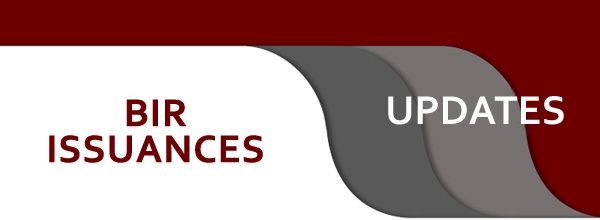
- RR No. 2-2019, March 19, 2019 - This revenue regulation prescribes the rules in implementing the imposition of excise tax on non-essential services introduced by TRAIN Law.
- RMC 31-2019, March 7, 2019 - This revenue memorandum circular reiterates the tax compliance requirements of candidates, political parties/party list groups and campaign contributors on their registration, update and other tax compliance requirements following RMC No. 38-2018.
- RMC 34-2019, March 4, 2019 - This revenue memorandum circular clarifies the treatment and reporting requirements on input tax of drugs and medicines exempt from VAT as of December 31, 2018.
- RMC 37-2019, March 18, 2019 - This Circular prescribes the newly revised BIR Form No. 1701 [Annual Income Tax Return for Individuals (including mixed income earner), Estates and Trusts] January 2018 ENCS, which was revised due to the implementation of the TRAIN Law.
- RMC 38-2019, March 25, 2019 - This revenue memorandum circular amends RMC No. 102-2018 as regards the deadline for the processing of pending VAT Refund/Credit claims filed prior to the effectivity of RMC No. 54-2014.
Replace this paragraph.
Replace this paragraph
Replace this paragraph.
Replace this paragraph
Replace this paragraph.
Replace this paragraph
Replace this paragraph.
Replace this paragraph
Replace this paragraph.
Replace this paragraph
Replace this paragraph.
Replace this paragraph
Replace this paragraph.
Replace this paragraph
Replace this paragraph.
Replace this paragraph
Replace this paragraph.
Replace this paragraph
Replace this paragraph.
Replace this paragraph
The fifteen-day period granted to the taxpayer to reply to the PAN before a FAN can be issued is mandatory.
The taxpayer states that the FAN was issued prior to the lapse of the fifteen (15) day period granted by law to respond to the PAN. Thus, the taxpayer argues that the FAN was issued in violation of the due process requirement, thereby rendering the FAN void. Petitioner further argues the fact that the BIR already prepared, finalized and issued the FAN prior to the lapse of the reglementary period proves that the BIR could not have considered the taxpayer’s reply to the PAN when it issued the FAN.
The BIR, on the other hand, contends that it has substantially complied with the requirements under RR 12-99 when it issued the FAN sixteen (16) days after issuance of the PAN to the petitioner. The BIR also argues that a protest against the PAN is not indispensable, and the fact of non-protest of the PAN will not render the PAN final and executory.
The CTA noted that the fifteen-day period granted to the taxpayer to reply to the PAN before a FAN can be issued is mandatory. Time is essential in this entire procedure of administrative protest because any escalation in the levels of the protest, i.e., FLD/FAN, leaves the taxpayer with fewer options, such as going to the Court of Tax Appeals on appeal or entering into a compromise settlement, among others, which all entail financial costs to the taxpayer. Hence, the period granted to assail the PAN is integral to the right of due process granted by law to the taxpayer. (Monza SPV-AMC ("Asset Management Co.), Inc. v. Commissioner of Internal Revenue, CTA Case No. 9153, April 15, 2019)
When guilt is not proven with moral certainty, presumption of innocence must be favored, and exoneration must be granted as a matter of right.
Taxpayer is charged of the crimes of (1) attempt to evade or defeat the payment of Value-Added Taxes (VAT); (2) attempt to evade or defeat tax by substantial under-declaration of income tax; (3) failure to file VAT Return; and (4) failure to supply correct and accurate information in his Income Tax Return. During the trial, it was admitted that the BIR merely relied on the deferred revenue account stated in the accused's financial statement then conclude that there is an undeclared income.
The Court ruled that for lack of supporting documents, the prosecution has failed to convince this Court that there is undeclared income. The BIR failed to prove the elements of the crimes charged. Under Sections 254 and 255 of the National Internal Revenue Code of 1997, as amended. "When guilt is not proven with moral certainty, it has been our policy of long standing that the presumption of innocence must be favored, and exoneration granted as a matter of right”. (People of the Philippines vs Arnel Cortez Manaloto, CTA Crim. Case Nos. O-454, O-455, O-456, and O-457, April 16, 2019)
Section 40(C)(2)(a) in relation to 40(C)(6)(b) of the NIRC does not require prior BIR ruling validating an exchange transaction as tax-free.
The BIR assessed the taxpayer for deficiency income tax, VAT and DST for the transfer of assets of taxpayer to Fortune Tobacco Corporation (FTC) in exchange for the latter’s shares. The BIR contends that the provisions of RR No. 18-2001 are mandatory preconditions for a taxpayer to avail of the benefits of Section 40(C)(2) of the NIRC, as amended. Specifically, a request for ruling on such matter, plus a BIR Certification/Ruling affirming the transaction as a tax-free exchange must be appended to requesting party's audited financial statement and income tax returns during the year of exchange must first be complied with.
The court ruled that nowhere in Section 40(C)(2)(a) in relation to 40(C)(6)(b) of the NIRC, as amended, that requires a prior BIR ruling validating an exchange transaction as tax-free before respondent may reap the benefits of the foregoing provisions. The statute only requires a corporation to exchange all or substantially all of its property for shares of stock of another corporation under a legitimate business objective.
Neither RR No. 18-2001 mandates a tax certification or ruling confirming the exchange as being absolved from tax as a prerequisite for the enjoyment of the benefit conferred under Section 40(C)(2) of the NIRC, as amended. It merely serves as a guide for the BIR to track the basis of a property and/or shares of stock received through an exchange transaction contemplated by the foregoing provision in the event of subsequent disposition thereof. (Commissioner of Internal Revenue vs. Premium Tobacco Redrying & Fluecuring Corporation, CTA EB No. 1755, (CTA Case No. 8897), April 22, 2019)
Replace this paragraph.
Replace this paragraph
Replace this paragraph.
Replace this paragraph
Replace this paragraph.
Replace this paragraph

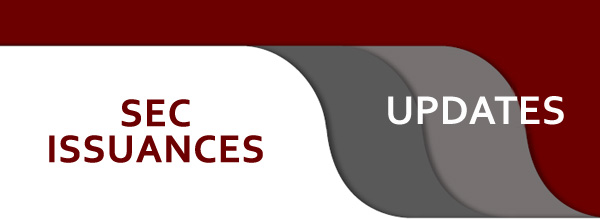
- SEC Memorandum Circular No. 5 series of 2019, March 14, 2019 - This memorandum circular provides the guidelines on the implementation of ASEAN Capital Market Forum (ACMF) Pass under the ASEAN Capital Market Professional Mobility Framework.
- SEC Notice, March 15, 2019 - This notice requests for comments, not later than 29 March 2019, on the proposed amendments to the guidelines and procedures on the use of corporate and partnership names.
- SEC Notice, March 15, 2019 - This notice requests for comments, not later than 29 March 2019, on the proposed guidelines on the conversion of an ordinary stock corporation into One Person Corporation (OPC).
- SEC Notice, March 15, 2019 - This notice requests for comments, not later than 29 March 2019, on the proposed guidelines on the establishment of a One Person Corporation (OPC).
- SEC Notice, March 15, 2019 - This notice clarifies rules for the filing of Audited Financial Statements (AFS) pursuant to the Revised Corporation Code of the Philippines.
- SEC Notice, March 22, 2019 - This notice requests for comments, not later than 5 April 2019, on the proposed guidelines on corporate term.
- SEC Notice, March 26, 2019 - This notice requests for comments, not later than 10 April 2019, on the draft Rules on Material Related Party Transactions for Publicly-Listed Companies.
- SEC Notice, March 28, 2019 - This notice requests for comments, not later than 15 April 2019, on the draft Updated Anti-Money Laundering (AML) Module for the SEC Certification Examination.
Replace this paragraph.
Replace this paragraph
Replace this paragraph.
Replace this paragraph
Replace this paragraph.
Replace this paragraph
Replace this paragraph.
Replace this paragraph
Replace this paragraph.
Replace this paragraph
Replace this paragraph.
Replace this paragraph
Replace this paragraph.
Replace this paragraph
Replace this paragraph.
Replace this paragraph
Replace this paragraph.
Replace this paragraph
Replace this paragraph.
Replace this paragraph


- A company’s corporate purpose may not be expanded by the mere adding of activities. (SECOGC Opinion No. 19-04, March 4, 2019, Re: General Financing Activities)
- Under the SEC guidelines, a certificate of approval of increase of authorized capital stock may be revoked if there is (1) a failure to submit the proof of transfer of ownership within 90 days, and (2) an opportunity to be heard. (Pacific Star Properties, Inc. vs. Company Registration and Monitoring Department, SEC En Banc Case No. 10-10-216, March 7, 2019)
- Proper service of papers shall be done by tendering a copy of the same to an exclusive list of persons, an incorporator included, by leaving a copy at his dwelling house or residence with some person of suitable age and discretion residing therein; service to the last known or registered address with the Commission of the person being served shall suffice. (Kapa-Community Ministry International, Inc. vs. Enforcement and Investor Protection Department, SEC Admin. Case No. 02-19-181, March 14, 2019)
Replace this paragraph.
Replace this paragraph
Replace this paragraph.
Replace this paragraph
Replace this paragraph.
Replace this paragraph
Replace this paragraph.
Replace this paragraph
Replace this paragraph.
Replace this paragraph
Replace this paragraph.
Replace this paragraph
Replace this paragraph.
Replace this paragraph
Replace this paragraph.
Replace this paragraph
Replace this paragraph.
Replace this paragraph
Replace this paragraph.
Replace this paragraph

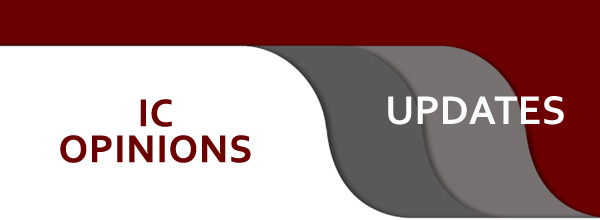
- IC Legal Opinion (LO) No. 2019-03, March 14, 2019 – This opinion deals with clarifications on certain issues regarding the Compulsory OFW Insurance
- IC LO No. 2019-04, March 19, 2019 – This opinion deals with whether or not Starr International Insurance Philippines Branch (SIIP) is subject to strict compliance of the Circular Letter by the Insurance Commission which pertains to rules on number of seats, qualifications and term limits of independent director.
- IC LO No. 2019-05, March 25, 2019 – This is an opinion in relation to the application/enrollment form of microinsurance.
Replace this paragraph.
Replace this paragraph
Replace this paragraph.
Replace this paragraph
Replace this paragraph.
Replace this paragraph
Replace this paragraph.
Replace this paragraph
Replace this paragraph.
Replace this paragraph
Replace this paragraph.
Replace this paragraph
Replace this paragraph.
Replace this paragraph
Replace this paragraph.
Replace this paragraph
Replace this paragraph.
Replace this paragraph
Replace this paragraph.
Replace this paragraph

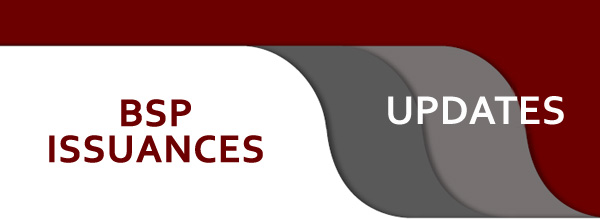
- Bangko Sentral ng Pilipinas (BSP) Circular Letter (CL) No. 2019-019, March 4, 2019 – This letter provides for an advisory for all BSP-Supervised Financial Institutions (BSFIs) to comply with the amendments to the foreign exchange transactions under Circular No. 1030.
- BSP Memorandum No. 2019-006, March 14, 2019 – This memorandum provides for the registration of operators of Automated Teller Machines (ATMs) that allow the purchase or exchange of Virtual Currencies (for example, Bitcoin) or other devices with similar functions and
capabilities. - BSP Circular No. 1034, March 15, 2019 – This circular approves the amended subsections X176.5/4176Q.5 of the Manual of Regulations for Banks (MORB)/Manual of Regulations for Non-Bank Financial Institutions (MORNBFI) pertaining to the extension of observation period for the Basel III Framework on Liquidity Standards – Net Stable Funding Ratio (NSFR) for subsidiary banks/quasi-banks (QBs) of universal and commercial banks.
- BSP Circular No. 1035, March 15, 2019 – This circular approves the amended subsections X176.1/4176Q.1 of the Manual of Regulations for Banks (MORB)/Manual of Regulations for Non-Bank Financial Institutions (MORNBFI)
Replace this paragraph.
Replace this paragraph
Replace this paragraph.
Replace this paragraph
Replace this paragraph.
Replace this paragraph
Replace this paragraph.
Replace this paragraph
Replace this paragraph.
Replace this paragraph
Replace this paragraph.
Replace this paragraph
Replace this paragraph.
Replace this paragraph
Replace this paragraph.
Replace this paragraph
Replace this paragraph.
Replace this paragraph
Replace this paragraph.
Replace this paragraph

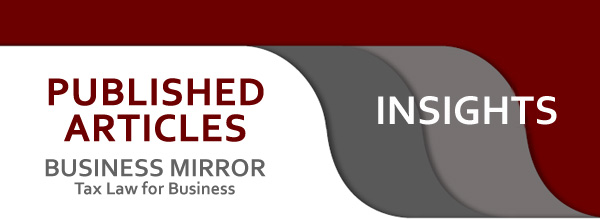
Ease In Paying Taxes
By Benedicta 'Dick' Du-Baladad
WIth the onset of the tax-filing season, and in relation to the Ease of Doing Business (EODB) law mandating the efficient delivery of government services, let me stir thistalk again about ease in paying taxes.
As early as last month, the BIR launched the tax-filing season with an earnest appeal for taxpayers to file and pay their taxes early and correctly. In response, taxpayers made a counter-appeal for the government to please do something to make payment of taxes less costly, easy and a pleasant experience they would look forward doing again.
For years, April 15 has been a hurdle, ending one’s day with a sigh of “YES, I survived.” This, notwithstanding the availability of an electronic payment and filing system. Happy for those who can hire professional help, they are blessed, but sadly, not many can afford one.
And I blame this on the tax structure that we have—a complicated tax system that is complicated further by complicated implementing rules, guidelines and procedures. The result is a complex web of inefficiencies, making the life of a taxpayer difficult.
This year could be different, especially for individuals engaged in business and with income of P3 million and below (the micro, small and medium enterprises). Taxpayers in this category are given the option of paying a single flat rate of 8 percent of gross sales or receipts in lieu of paying the regular multi-rated income tax and the 12-percent value-added tax. We call this a presumptive
income tax.
Thanks to Tax Reform for Acceleration and Inclusion (TRAIN) 1, which introduced this simplified taxation precisely to encourage the MSMEs to surface, join the tax net, pay their taxes regularly and timely and without fear of being penalized.
With this simplification, the BIR is expected to simplify implementation, as well, to ensure achieving the intent and purpose of TRAIN 1. But, I would say, it is not just about simplification in the payment of taxes that this sector needs. It is a lot more than that.
What MSMEs need is a wholistic management approach where policies are specifically designed for them—a separate taxpayer segment with special needs, having its own peculiarities and behavior. A wholistic approach that runs the whole gamut of tax compliance—from registration, bookkeeping, invoicing, tax filing and payment, tax audit, collection procedures, up to closure of the business—is what this sector needs.
The MSMEs need assistance more than anyone else. Thus, policies should be directed more on tax assistance such as tax education, information, campaign to register and the like. Not strict tax enforcement, or they will hide more.
For example, assistance desks dedicated solely to MSMEs should be set up in all Bureau of Internal Revenue (BIR) payment centers and frontline offices ready to assist in registration, printing of invoices, filling up tax returns, payment of taxes, etc. Basic training on proper bookkeeping is also important. Simplifying tax forms is a must. TRAIN 1 mandates that tax returns should not exceed four pages. For MSMEs, perhaps a one-page simplified tax return can be done.
For a long time, this sector has not been paid much attention to by the BIR, perhaps because it is more costly to run after them compared to the revenue potential to be generated. Instead, the BIR concentrated on large taxpayers already in the net, auditing them yearly, squeezing them for more payments and monitoring them regularly.
MSMEs comprise 99.56 percent of all businesses in the country, according to the 2017 data of the Philippine Statistics Authority (PSA). Compared to only more than 4,000 large businesses, their number runs close to a million, dominating the wholesale and retail trade sector (e.g., the sari-sari stores, parlor shops, tricycle repair, canteens and the like) and concentrated in the National Capital Region, Central Luzon, Calabarzon and Central Visayas. Of this number, 89 percent are micro enterprises.
Is there really no revenue prospect from MSMEs? There is, and its not peanuts. My sense is, the almost a million figure from the PSA pertains only to those registered. The sari-sari stores alone are already more than a million, I heard. In which case, we are talking here of a lot bigger number of MSMEs.
The PSA report says that in terms of value added, the MSME sector contributes 35.7 percent of the total value added generated in the country. They account for 25 percent of the country’s total exports revenue, normally through subcontracting arrangement with large firms, or as suppliers to exporting companies. This means that this taxpayer segment should be contributing at least 35 percent of the total revenue collection. A P1,000 monthly payment from each, for example, easily translates to P12-billion revenue collection.
The MSMEs have been crying for help, wanting to contribute their share. And so, we did our share.
Our firm, Du-Baladad and Associates, recently released a 10-pager handy pamphlet on “A Quick and Easy Tax Guide for MSMEs.”
This was translated in Tagalog by the Women Business Council of the Philippines (Womenbiz) to cater to those who may find difficulty in English: “Isang Madali at Mabilis na Gabay sa Pagbabayad ng Buwis para sa MSMEs.”
This booklet is given for free to MSMEs who may need a copy. It is our contribution to the tax education and assistance of MSMEs, a part of our firm’s corporate social responsibility, which we have seriously taken upon ourselves to champion.
Any organization or association assisting or dealing with MSMEs may e-mail us for free copies. You can also download this from our web site at www. bdblaw.com.ph.
----------------------------------------------
For inquiries on the article, you may call or email
ATTY. BENEDICTA “Dick” DU-BALADAD
Founding Partner & CEO
T: +63 2 403 2001 loc. 300
This email address is being protected from spambots. You need JavaScript enabled to view it.


Ceremonial Turnover at Fundado Elementary School

The students and teachers of Fundado Elementary School in Libmanan, Camarines Sur can now dream bigger and look forward to a bright new environment more conducive for learning with the turnover of a new classroom building and the newly renovated comfort rooms donated by BDB Law Foundation Inc. The classroom building is fully-equipped with armchairs, teachers’ desks, blackboards, wall fans and toilets. This is the 6th classroom building built in partnership with Children’s Hour Foundation. The ceremonial turnover was graced by BDB Law Foundation’s Chairman Atty. Benedicta Du-Baladad and Director Atty. Irwin C. Nidea, Jr., Fundado Elementary School teaching staff headed by their School Principal, and from Children’s Hour, Ms. Ovy Jimenez and Mr. Eric Name. (March 22, 2019, Fundado Elementary School, Libmanan, Camarines Sur)








